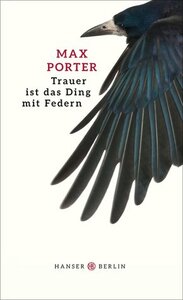You need to sign in or sign up before continuing.
Take a photo of a barcode or cover
emotional
reflective
sad
fast-paced
Plot or Character Driven:
Character
Strong character development:
Complicated
Loveable characters:
No
Had a nice little cry on my patio when I finished the book because I thought it was so beautiful. Captured essences of grief and somehow kept the light and humour.
dark
emotional
funny
mysterious
sad
fast-paced
Plot or Character Driven:
Character
Strong character development:
Complicated
Loveable characters:
Complicated
Diverse cast of characters:
No
Flaws of characters a main focus:
Yes
You've lived a long time and been a crow through and through, but you still can't take a joke.
It struck me, reading Grief is the Thing with Feathers, how odd it is that this book has spawned not one but two major adaptations featuring Big Name Actors™: first a stage play by the Irish playwright Enda Walsh, starring Cillian Murphy, then a film - titled simply The Thing with Feathers; I suppose they lost the "Grief is" because it was cleaner - that premiered at Sundance this year, starring Benedict Cumberbatch. I say that because the book, Max Porter's first, is, pardon the pun, a truly odd bird. An elliptical observation of grief and recovery, it takes for its subject Dad, a scruffy academic, and his two Boys. When we meet them, they're mourning the sudden loss of their mother; one day, in the early stages of their sorrow, a Crow arrives at the door, a mysterious figure who finds humans "dull except in grief." He tells Dad that he'll stay in their flat until they no longer need him. As the years elapse, the Boys grow up, Dad writes a book about the poet Ted Hughes (perhaps best known for his series of poems written after the death of Sylvia Plath, collectively known as - wait for it - the Crow poems), and Crow offers his own sardonic, foul-mouthed commentary as they try to move on with their lives.
That last paragraph represents an attempt to impose a proper narrative structure on a book that is sometimes doggedly determined to avoid one, to both its credit and to its occasional detriment. There's a clear inciting incident and a clear ending, but in between those two poles (in the book's very slim 114 pages), Porter scrambles the chronology, jumping to accounts from his three narrator figures that could come at any point on their road to acceptance. In that way I suppose it mirrors its subject matter, and Porter has a knack for casting a spell with his prose, particularly when playing his differing narrative voices off of one another. One striking example finds Dad giving a brief, heartfelt monologue about the intensity of his grief, concluding with a truly gutting phrase: "the whole city is my missing her." Crow, not missing a beat, responds, "Eugh, you sound like a fridge magnet." It's in this exchange where what Porter is doing in Grief is the Thing with Feathers is most gripping, plunging the reader into the depths of sorrow, then blindsiding them with pitch black humor with the control of an orchestra conductor.
I'll admit that some passages - particularly when the Boys have the spotlight - either went a bit over my head or felt like padding, which sticks out all the more sorely in a story this brief and which explains the score being what it is. However, the novella's brevity is also what gives it its strange, beguiling power. Porter judged its length well: any longer and the prose's incantatory effect would start to wane, any shorter and the already slight narrative might entirely dissipate. As it is, Grief is the Thing with Feathers is a carefully polished jewel of a story, curious and intelligently observed and, in many ways, truly unlike anything I've read before.
Moderate: Death, Grief, Death of parent
La verdad es que esta puntuación y esta reseña no son demasiado justas, ya que creo que con este libro he tenido una barrera importante con el idioma. Lo leí en inglés, animada por su corta extensión, pero desde luego no tengo el nivel suficiente en este idioma como para haberlo apreciado en su totalidad.
Este libro es muy poético, tiene una narración muy rara y una gran cantidad de vocabulario que se me escapaba. Mucho simbolismo, mucha metáfora, y creo que por eso fui incapaz de conectar con la historia y con los sentimientos, porque me estaba perdiendo gran parte de las sutilezas. Una pena, porque creo que si lo hubiera leído en español me hubiera gustado más.
Este libro es muy poético, tiene una narración muy rara y una gran cantidad de vocabulario que se me escapaba. Mucho simbolismo, mucha metáfora, y creo que por eso fui incapaz de conectar con la historia y con los sentimientos, porque me estaba perdiendo gran parte de las sutilezas. Una pena, porque creo que si lo hubiera leído en español me hubiera gustado más.
Overall I am not sure what I thought of this book, but I loved many of the "Dad" sections - they were beautiful.
challenging
dark
tense
fast-paced
Plot or Character Driven:
Character
Strong character development:
Complicated
Loveable characters:
No
Diverse cast of characters:
Complicated
Flaws of characters a main focus:
Complicated
fast-paced
dark
emotional
funny
reflective
sad
fast-paced
Plot or Character Driven:
Character
Strong character development:
Yes
Loveable characters:
Yes
Diverse cast of characters:
No
Flaws of characters a main focus:
Yes
challenging
emotional
mysterious
slow-paced
Plot or Character Driven:
Character
dark
emotional
hopeful
mysterious
reflective
sad
fast-paced
Plot or Character Driven:
Character





